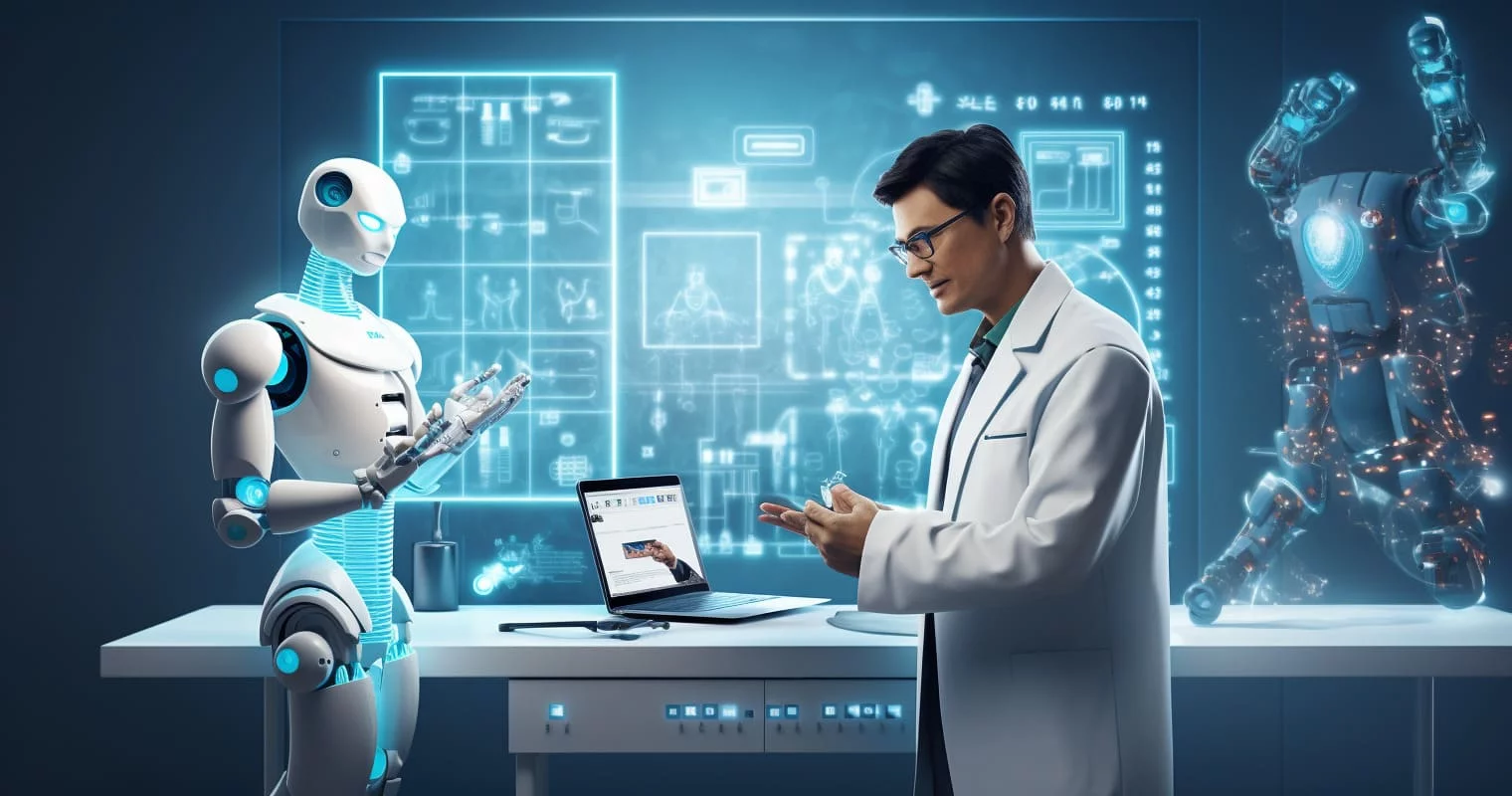
A Guide to AI Solutions for Streamlining Hospital Staff Training
In the fast-evolving field of healthcare, continuous training and skill development for hospital staff are essential to meet patient needs effectively and keep up with medical advancements. Traditional training methods are often time-consuming, resource-intensive, and can interrupt regular hospital operations. AI-powered hospital education tools are transforming these practices by providing adaptive, interactive, and accessible training solutions that fit seamlessly into hospital workflows. This blog explores how AI for healthcare staff training optimizes learning, enhances staff readiness, and ultimately improves patient care.
The Role of AI in Healthcare Staff Training
AI in healthcare staff training offers several benefits, from simulating real-life scenarios for skill enhancement to personalizing training content for each staff member based on their learning style and performance. AI-powered training tools analyze data to adapt learning experiences, making training more relevant and engaging for the staff. This approach is especially useful for staff roles that require continuous updates, like Medical AI Chatbot management, clinical data management, and other critical operational roles.
Key Benefits of AI-Driven Training for Hospital Staff
- Personalized Learning Paths
AI allows for adaptive learning, tailoring training content based on an individual’s strengths, weaknesses, and progress. This personalization helps healthcare professionals focus on areas where they need improvement, ensuring more effective training outcomes. - Simulations and Virtual Practice Environments
By simulating real-world healthcare situations, AI-driven training tools allow staff to practice critical skills in a risk-free environment. This is particularly useful in teaching hands-on skills and emergency response techniques. - Efficient Use of Time and Resources
Training programs powered by AI can be accessed anytime, reducing the need for staff to be physically present and minimizing disruptions to hospital operations. - Continuous Skill Development
AI tools offer continuous updates and skill checks, enabling staff to stay current with the latest medical practices, technologies, and healthcare regulations.
How AI Enhances Specific Areas of Healthcare Staff Training
1. Clinical Data Management Training
In hospitals, clinical data management is essential for maintaining accurate patient records, research data, and regulatory compliance. AI-powered training platforms offer targeted education on data handling protocols, privacy regulations, and efficient use of data management software. Training that focuses on clinical data ensures staff understand both the technical and ethical dimensions of handling patient data.
- Use Case: By integrating training modules that simulate data entry scenarios, staff learn to minimize errors, improving the accuracy and security of data management practices.
2. Training for AI-Driven Patient Interaction Tools
Medical AI Chatbots are increasingly used in patient communication, handling queries, appointment scheduling, and providing health information. Training hospital staff on the use and maintenance of AI chatbots ensures they can troubleshoot issues, optimize chatbot responses, and manage patient data responsibly. Staff training also includes understanding chatbot limitations and knowing when to direct patients to human assistance.
- Impact on Patient Care: Efficient chatbot management improves patient satisfaction by providing timely information and reducing wait times for routine inquiries.
3. Adaptive Training for Medical Scribe Roles
What is a medical scribe? A medical scribe assists doctors by documenting patient interactions and ensuring accurate clinical records. AI-powered training for medical scribes includes simulations that replicate real-life documentation tasks. These tools can adjust the complexity of scenarios based on the trainee’s progress, enabling medical scribes to build skills in a structured, manageable way.
- Case Study: A hospital using an AI platform to train medical scribes reported a 30% reduction in documentation errors, leading to improved patient record accuracy and compliance with health regulations.
Key AI Solutions for Staff Training
AI-Driven Learning Management Systems (LMS)
Many hospitals now use LMS platforms powered by AI to manage and monitor staff training programs. These systems provide a centralized platform for training resources, track staff progress, and adjust learning content based on individual performance.
- Features: Automated reminders, personalized content, real-time feedback, and data tracking to measure training effectiveness.
Virtual Reality (VR) Simulations
VR, combined with AI, offers immersive training experiences for healthcare professionals. VR simulations can replicate surgical procedures, emergency responses, and even routine patient interactions, allowing staff to gain experience in a realistic but controlled environment.
- Application: VR training for emergency scenarios, such as cardiac arrest or trauma response, provides hands-on experience that improves reaction times and skill retention.
Interactive Chatbots for Real-Time Assistance
Some training platforms incorporate AI-driven chatbots that assist learners in real-time. These chatbots provide immediate answers to questions about medical protocols, equipment usage, or patient care best practices, supporting on-the-job learning.
- Example: Chatbots for medication administration queries help nursing staff verify dosages and interactions instantly, reducing the risk of medication errors.
Case Studies: Successful Implementation of AI in Staff Training
Case Study 1: Implementing Adaptive Learning for Clinical Skills

A large hospital implemented an AI-powered LMS for training clinical staff on patient care protocols and clinical data management practices. The system used adaptive learning to adjust content based on the learner’s pace and performance. This personalized approach helped improve staff retention rates and patient safety compliance.
- Outcome: Clinical staff reported higher confidence in their skills, and the hospital achieved a significant decrease in patient care errors linked to documentation.
Case Study 2: VR Training for Emergency Response
A metropolitan hospital introduced VR simulations powered by AI for training emergency response teams. Scenarios included simulated cardiac events, trauma care, and mass casualty responses. Staff members could practice handling high-stress situations repeatedly, improving their preparedness.
- Results: The hospital observed faster response times in real emergencies, with emergency team members exhibiting increased confidence and reduced anxiety.
Challenges and Considerations in Adopting AI Training Solutions
While AI offers substantial benefits for hospital staff training, there are several challenges to consider:
- Cost of Implementation
High-quality AI training tools, especially VR and adaptive learning platforms, require significant investment. Smaller hospitals may find these costs prohibitive without external funding or support. - Data Security and Compliance
Training platforms that involve clinical data must comply with strict data security regulations to protect sensitive patient information. It is crucial for hospitals to choose vendors that prioritize security. - Staff Adaptability
Some healthcare staff may be resistant to AI-driven training methods, preferring traditional, in-person training. Hospitals must provide support and resources to ease this transition.
User Experience with AI-Powered Training in Healthcare
Healthcare professionals who have experienced AI-driven training report higher engagement and satisfaction with the learning process. AI offers real-time feedback, which makes the learning experience interactive and responsive. Additionally, AI training tools are accessible 24/7, allowing staff to learn at their convenience. Staff working in roles related to clinical data management appreciate the structured, hands-on approach to handling data accurately and efficiently.
By improving knowledge and skills in real-time scenarios, AI training enhances overall job performance and boosts confidence among healthcare professionals.
User Experience with AI in Hospital Staff Training
Healthcare staff find AI training methods engaging, accessible, and beneficial for practical skill-building. By providing real-time feedback, AI tools offer a unique learning experience that improves knowledge retention and allows for hands-on practice. Hospitals implementing AI-powered training report increased confidence among staff, improved patient outcomes, and better regulatory compliance.
Healthcare staff find AI training methods engaging, accessible, and beneficial for practical skill-building. By providing real-time feedback, AI tools offer a unique learning experience that improves knowledge retention and allows for hands-on practice. Hospitals implementing AI-powered training report increased confidence among staff, improved patient outcomes, and better regulatory compliance.
Conclusion
AI for healthcare staff training is a transformative tool that provides personalized learning, reduces errors, and enhances patient care quality. From VR simulations to AI-driven adaptive learning systems, AI equips hospital staff with essential skills and knowledge for an increasingly complex healthcare environment. Hospitals adopting these AI-powered tools see improved performance, reduced training costs, and better-prepared staff ready to meet patient needs efficiently.
As hospitals and clinics continue to evolve, incorporating advanced AI-powered education tools for healthcare staff will ensure consistent skill-building, better knowledge retention, and an enhanced ability to respond to real-world medical situations. Whether through Medical AI Chatbots for patient communication or real-time training support, AI is streamlining hospital workflows and paving the way for a more effective healthcare ecosystem.
FAQs on AI Solutions for Hospital Staff Training
How do AI tools support healthcare staff training?
AI tools personalize the training experience, making learning more efficient and targeted. By analyzing individual performance, AI adjusts content to help staff improve in specific areas.
What are the best AI-powered platforms for hospital staff education?
Some top platforms include adaptive learning management systems, VR simulations for emergency response, and chatbots for real-time assistance. These tools make training more flexible and accessible.
What is a medical scribe, and how is AI used in their training?
A medical scribe records clinical interactions and maintains patient records. AI helps train scribes by simulating documentation tasks, improving accuracy and reducing errors in clinical data management.
How do Medical AI Chatbots aid in staff training?
Medical AI Chatbots assist by answering common questions during training, providing reminders, and offering on-demand information for specific tasks. This helps reduce administrative workload and supports continuous learning.
Why is clinical data management training essential for healthcare staff?
Proper training in clinical data management ensures staff handle patient information accurately, comply with regulations, and contribute to streamlined workflows that enhance overall patient care.



